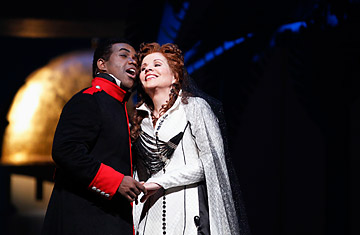
When you think about innovative, technologically hip industries, opera isn't high on anyone's list. Its audience is graying — the median age is 48 — and during the recession, high-ticket prices haven't helped the sopranos. Opera companies in Baltimore and Connecticut have recently shut down, and others are barely hanging on. So it comes as a bit of a surprise that the Metropolitan Opera in New York City, the world's largest and most prestigious opera house, has become a hit in the digital space.
Since 2006, the Met has beamed selected operas, in high definition, into movie theaters around the globe. The Met's home stage in New York City's Lincoln Center holds only 3,800 people; so far this season, the Met has sold a record 2.2 million tickets for its nine live high-definition telecasts, an increase of 400,000 over last season's total. Overall, operas have been shown in 1,200 theaters in 44 countries worldwide, from Iceland to New Zealand. On May 1, nearly 200,000 people saw Rossini's Armida, starring soprano Renee Fleming and tenor Lawrence Brownlee. And in June the Met will debut a Summer HD Encore Series, a replay of six operas that will be screened in 400 theaters throughout the United States, including cities far from midtown Manhattan, like Bozeman, Montana, and Mankato, Minnesota.
The screenings are the brainchild of Peter Gelb, who became general manager of the Met in 2006. The former president of Sony Classical, Gelb is known as a marketer more than an opera insider, and he saw an opportunity in theaters that struggling sports like boxing have also tried to cash in on: for millions of fans who can't see an expensive event live, deliver a communal experience to them in the movie theater that at least somewhat replicates the live event. "Opera is an aging art form," says Gelb. "I wanted to try to keep it fresh and connected to its audience."
To Gelb, the most satisfying part of the theater endeavor is seeing the electricity in the audience. "Audiences applaud at the conclusion of a stirring aria as if they were in the opera house," he says. "For opera fans, that's like A-Rod hitting a home run in the bottom of the ninth. It's like a sporting experience." The HD telecasts have had their technical glitches: one opera lover who attended a New York City screening of Madama Butterfly last summer left after the first act because the sound and picture were out of synch. Despite such hiccups, the sound quality is generally top-notch, and price is hard to beat: while the average cost of an opera house ticket is $122, the average theater ticket is just $20.
No doubt, the Met still has brutal fiscal problems. "The economics of opera are impossible to begin with," says Gelb. The productions are elaborate, and unions make sure the singers, orchestras and stagehands are all handsomely compensated. According a recent analysis by Vanity Fair, the Met's endowment is down 26% over the last two fiscal years, and the opera has accumulated a $47 million deficit. But Gelb says the HD theater business is profitable. "It's contributing to, not draining, our resources," Gelb says.
The HD telecasts are continuing to spread around the globe. A theater chain in Spain has just signed up to show Met operas in 25 theaters; Germany and Austria have recently added 100 screens between them. With sports events toying with doing telecasts in 3D, is Gelb considering taking the next technological leap? "We're looking into it," says Gelb. Yet he admits that 3D operas might simply be distracting. "Our audience skews older," Gelb says. "I'm not certain they're going to want to wear glasses for four hours. And I'm not sure whether you want to see a tongue flying out of the tonsils of an opera singer."
